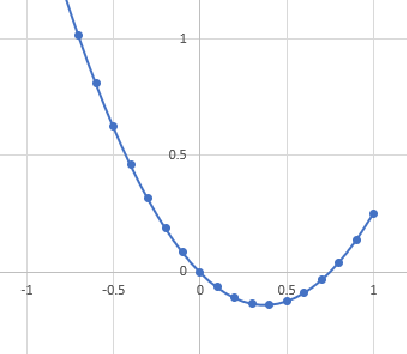In this post I am going to be looking at question given to my A-Level student in a recent test. We need to be considering how to find when there are no quadratic roots using a fact I considered in a recent video on my YouTube Channel
The Question we are looking at is
The equation kx2 + 4kx + 3 = 0 has no real roots
Show that 0 <= k < 3/4
As I give in the video, the clue to finding out when there can be no real roots lies in the formula for solving quadratic equations. The part in a square root sign must be > 0
b2 – 4ac > 0 where the equation is ax2 + bx + c = 0
Form another inequality
In this question, the a and b are given in terms of another unknown, k. but we can now form an inequality statement
(4k)2 – 4 x k x 3 < 0
Which we can reform as

16k2 – 12k < 0
and factorise to
3k(4k – 3) < 0.
The graph of this new quadratic is shown here. Because the k2 is positive, the curve is a smiley face, not a glum face.
This means that the part where the graph is negative
is between the roots
This means we know that 0 < k < 3/4
Boundary cases
But the interesting cases are where k = 0 and k = 3/4. We have to be careful here because its not clear what these values mean for our original equation at these values. We need to check back.
If k = 3/4, the original equation is
3/4 x2 + 3x + 3 = 0
If we factorise out the 3/4 we get
1/4 (3x2 + 12x + 12) = 0
3/4(x2 + 4x + 4) = 0
3/4 (X+2)2 =0
And as we can see, -2 is a root of this equation, but there are no others. so k=3/4 does NOT meet the criteria of there being no real roots but does describe the special case of there being exactly 1 root.
One might think that k=0 will also give a 1 root case. Let’s see.
Setting k=0 and the original equation becomes
3 = 0 – which doesn’t seem to make sense. It certainly has no solution for x; For all x its an equation that will never be equal.
So k=0 also meets the required condition that the equations has no roots, or solutions
So we have shown that if k meets the criteria 0<= k < 3/4, the equation has no roots.